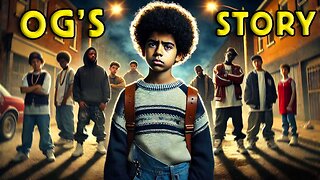Premium Only Content

FL Students Speak Out
Locals = https://sweethomesa.locals.com/
POPULIST REVOLT = https://populistrevolt.com/
Florida may be “where woke goes to die,” according to Florida Gov. Ron DeSantis, who has repeated the line in many speeches.
But talk of its demise is greatly exaggerated, according to some university students in the state and an organization that tracks progressive policies on college campuses.
Six conservative students attending a major Florida university told The Epoch Times, on condition of anonymity, about their frustration with the anti-white, anti-Christian, and anti-American environment on campus and in classrooms that makes them feel uncomfortable at best and threatened at worst.
Across the country, parents have pushed back against their community school boards for allowing radical race and gender theories in grades K-12. But experts told The Epoch Times that the same pushback hasn’t happened at the college level—the birthplace of Critical Race Theory (CRT).
CRT, the experts said, is rampant across the nation, not just in Florida. And that means conservative students nationwide are struggling to navigate college systems, where they face disdain for their beliefs and encouragement to reject their core values.
Carol Swain, a retired political science and law professor at Vanderbilt University and a frequent television analyst on race relations, sympathizes with the struggle conservatives face at colleges.
But she urges students to think strategically before outing themselves as holding conservative views, which are often unpopular among or even demonized by fellow students and professors.
Conservative students should pick their battles carefully, Swain told The Epoch Times, to successfully finish college—because the country needs young conservative voices in the professional world.
“There are key players that you want in position—you want [conservatives] to become university professors, or whatever profession they’re trying to go into,” Swain said.
‘Extremist’ views
A Christian law student, who supports the National Rifle Association (NRA), told The Epoch Times he didn’t know he’d been reported as “an extremist” for expressing conservative views until FBI agents knocked on his apartment door. They questioned him about his political views for more than an hour.
A journalism student said she felt bullied by a professor who forced students to parrot her scorn for America’s “systemic racism” and affirm “progressive talking points” on immigration, gender-identity issues, “queer theory,” intersectionality, transgenderism, religious faith, and the ideas of Karl Marx, author of “The Communist Manifesto.”
“I can’t write what I truly believe” about these issues, Mia said. “When I did that, I got an F. In order to pass a class, I have to affirm leftist ideas I don’t believe in. When I repeat all the talking points and present them as ideas I believe wholeheartedly, I get As.”
“It feels like being brainwashed when they reward you for repeating their ideas and punish you for saying things that go against their beliefs.”
At the core of the students’ struggle is the university’s apparent glorification of CRT, a Marxist-derived ideology that substitutes race or gender for class struggle. The theory divides people into two groups—oppressors and the oppressed—based on factors such as skin color or sexual orientation.
One of the leading architects of modern CRT is Ibram X. Kendi, who attended Florida A&M University, and later taught at the University of Florida. Kendi’s book, “How to be an Antiracist,” promotes fighting racism by discriminating against groups that, according to Kendi, are “oppressors,” such as white males. Antiracism practices often are taught in classes and employer trainings that promote “diversity, equity, and inclusion” (DEI).
Students said CRT, gender theory, and other topics considered “woke” are flourishing at their Florida university.
That’s despite attempts by Republican Gov. Ron DeSantis to stop racial activism in education and workplaces in his state by formally banning CRT training and discrimination.
CRT controversy
In April, DeSantis signed the Stop Wrongs to Our Kids and Employees Act, also known as the Stop WOKE Act. The law prohibits discriminatory classroom instruction, such as CRT. And it prohibits employers from forcing workers to attend antiracism and CRT training.
The law bans instruction that implies someone is responsible for actions committed in the past by other members of the same race, color, sex, or national origin. The measure also allows Floridians to sue if they believe their school or workplace has violated the law.
The Stop WOKE Act originated as a response to the spread of CRT and other social justice concepts widely promoted by works such as The New York Times’ 1619 Project, which paints America as a country founded on slavery and characterizes the nation’s Founding Fathers as racists.
While the 1619 Project has been rejected by many academics, historians, and politicians, its teachings have been embraced just as vigorously by many liberals and progressives. Many have held it up as a model of how history should be taught to children and college students.
Under the Stop WOKE Act, Florida university faculty members who teach CRT could be fired as part of post-tenure reviews. A violation of the Stop WOKE Act would make schools ineligible for what is known as performance funding. That’s extra money awarded by the state for measurable successes, such as high graduation rates and impressive median earnings of alumni.The threat of facing those repercussions for teaching CRT has sparked legal challenges.
Several Florida college professors and students filed a lawsuit challenging the Stop WOKE Act. They claim the law chills free speech in the classroom, confuses professors, and violates their First Amendment rights.
Chief U.S. District Judge Mark Walker, an appointee of former President Barack Obama, issued a preliminary injunction against the law in November. The DeSantis administration is appealing the decision.
Hostile Environment
Florida college students who spoke with The Epoch Times described a campus culture focused on race and social justice and hostile to conservative or Christian views. They asked to use pseudonyms to protect their identity, fearing retaliation for speaking publicly.
Jeff, a pre-law freshman, told The Epoch Times he felt pressure in an economics course to write about globalization as a “good thing,” even though he disagrees with it.
Globalization is a movement to reduce trade barriers and build closer political, social, and economic ties between countries. It has been criticized by conservatives, who warn it’s moving countries toward a one-world government that would strip away the sovereignty of nations.
Ellen, a Florida college freshman, said her classes have elements of gender theory, climate change, and race woven into teachings on business. One class defined professional attire by showing what would be appropriate for men, women, and people who identified as both genders, or neither.
In a required philosophy course, Ellen’s classmates seemed convinced they were doomed to die from what they were taught were human-caused climate changes, she said. The view that fluctuations in weather patterns might be a normal, natural occurrence that’s happened throughout history was not presented by the professor, she said.
And when the professor announced that President Joe Biden had recommitted the United States to the Paris Climate Accords, the room erupted in applause, she recalled. Unwilling to cheer, the moment made her feel alienated, she said.
In an introductory business course that focused on DEI, another student, Luis, said he was told to list all his “identities,” including being a white, heterosexual, Catholic male. The point of the assignment seemed to be to make white students feel ashamed, he said.
He ignored the risk of stigma and wrote that he would like to perpetuate his Irish-American bloodline.
Journalism major Mia spoke of a required class in which the professor emphatically spoke about “white privilege” and “systemic racism” as fact. If students wrote about views contrary to the professor’s anti-white, anti-establishment positions, their grades suffered, she said.
Speaking among themselves, classmates indicated they were afraid to ask questions or assert their true beliefs, she said.
One professor, who lauded the teachings of Marx, warned students on the first day of class that “hate speech,” which the professor didn’t define, would be reported to the dean, Mia said. It had a chilling effect.
The professor also warned students not to get “too comfortable” in writing about their beliefs in a journaling assignment, Mia said. That could lead to students being reported and punished, the professor promised, indicating she’d lodged formal complaints against students for such violations.
The professor praised students who acknowledged, with apparent regret, that their parents had not raised them to hold views similar to the professor’s but were thankful to finally be learning about progressive beliefs, Mia said.
Writing Satire for an ‘A’
The traditional belief that journalists should question authority and think for themselves was not taught in the required journalism class, Mia said. All assignments in the class would be “viewed through a lens of social justice,” students were told on the first day.
White people were described as “privileged” in readings assigned by the black professor, Mia said.
Students were told by the professor that it’s a “myth” that journalists must report both sides of a story. For example, if a journalist covers a story involving members of the Ku Klux Klan, the public doesn’t have to hear from them, the professor told the class, Mia said.
“Our government and social institutions have created advantages that disproportionately channel wealth, power, and resources to white people,” a slide from the professor proclaimed. “This affects everyone, whether we are aware of it or not.”
Students faced the ethical dilemma of choosing between turning in writings that affirmed the professor’s views, with which they disagreed, or failing the class, Mia said.
When she turned in a paper with views that opposed her professor’s, but were attributed to others, Mia received a failing grade. In that assignment, she defended Christianity as an institution that helped end slavery. That position was attacked by a teaching assistant, who penned scathing comments.
Desperate to pull up her grade, Mia came up with a plan. She’d pretend to agree, pursuing assignments as if writing for the satirical, social-media powerhouse, The Babylon Bee.
“It’s horrible. I feel so fake,” Mia told The Epoch Times. “I’m not learning anything, except to write things I don’t believe.”
Conservative on Campus
A Christian now studying law, Robert was only an undergraduate when he discovered the risk of being known as a conservative on campus. That revelation quickly became clear when two FBI agents knocked on his apartment door at 9 a.m. They told him they’d received an anonymous tip that he was “an extremist.”
“They did ask me if I was an extremist or was a member of extremist groups,” he told The Epoch Times. “I asked them to define it. When they hesitated, I asked if being a Christian or a member of the NRA qualified. They said, ‘No.'”
To their credit, Robert said, the two agents seemed to be “reasonable people.” They told him that, after speaking with him, they had no idea why someone would report him. He was told the case against him would be closed, he said.
Robert, now a second-year law student, says Florida’s new Stop Woke Act is “toothless.” Teachings that applaud principles of CRT, such as the need for “social justice,” are ubiquitous on campus, he said. In law courses, students are taught to consider skin color with regard to crime and punishment.
Robert said that because blacks have suffered racism at the hands of whites, students debated if “systemic racism” should be considered when sentencing people of color.
Discussions centered on whether black people should be punished less severely than white people for similar crimes to compensate for historical oppression of blacks by whites, and because whites, on average, live longer, Robert said.
“The new trend is to see the difference and discriminate,” he said.
‘Tear up the Constitution’
Robert, who focuses on constitutional law, recalled students arguing that the U.S. Constitution was illegitimate from the start, and was written by racist, old, white men. The professor didn’t express that he condoned that point of view, but he didn’t offer a rebuttal, either, Robert said.
Law students, he added, “talk about how we should tear up the Constitution.”
Chris, a third-year law student, objects to the pervasive LGBT ideology woven into classes.
“What does homosexuality have to do with bankruptcy, right?” he asked. “They were literally just pushing this same-sex, homosexual agenda.”
When answering questions on timed exams, students often lose precious moments trying to determine if gender is pertinent to the legal concept, or if it’s just an attempt to “virtue-signal,” Chris said.
Legal textbooks routinely use “she” when describing situations in which gender is not specified, Chris said. That causes confusion.
“I had to get used to reading these textbooks constantly referring to a lawyer as she.”
Traditionally, it’s been considered correct to use “he” and “him” as gender-neutral pronouns. Progressives have insisted on using other pronouns such as “she” and “they” when gender is not specifically designated. And failing to use a person’s “preferred pronouns” has meant harsh punishments, such as expulsion for students and termination for instructors around the country.
“The left preaches tolerance…until they become strong,” and then tolerance for opposing views ends, Chris said. “That’s what we saw with the communist revolutions.”
-
 LIVE
LIVE
Major League Fishing
2 days agoLIVE Tackle Warehouse Invitationals, Stop 2, Day 2
534 watching -
 4:59:34
4:59:34
SoundBoardLord
7 hours ago90's Cartoons, Chill Vibes, Good Conversations!
23.1K2 -
 9:52
9:52
Talk Nerdy Sports - The Ultimate Sports Betting Podcast
4 hours agoEpisode 3/15/25 - Sportsbooks Won Last Night. Not Tonight. No more excuses. No more heartbreaks!
31.5K2 -
 15:17
15:17
Shea Whitney
1 day ago $6.03 earnedI Used CASTOR OIL for 30 Days and THIS Happened!!!
33.6K26 -
 30:24
30:24
The Rad Factory
1 day ago $3.50 earnedI Bought The WORST Formula 1 Car On Marketplace
35.6K8 -
 21:14
21:14
ThinkStory
1 day agoSEVERANCE Season 2 Episode 9 Breakdown, Theories, Mysteries & More!
21.9K2 -
 12:09
12:09
Tactical Advisor
1 day agoNEW Daniel Defense PCC (FIRST LOOK)
23.1K3 -
 38:25
38:25
The Finance Hub
15 hours ago $10.34 earnedBREAKING: PAM BONDI JUST DROPPED A MASSIVE BOMBSHELL!!
19.4K78 -
 22:30
22:30
BIG NEM
18 hours agoI Joined My First Gang at 9 Years Old – OG’s Untold Story
18K2 -
 1:10:28
1:10:28
Tommy's Podcast
1 day agoMedia Decentralization | Sam Anthony (TPC #1,704)
13.3K3